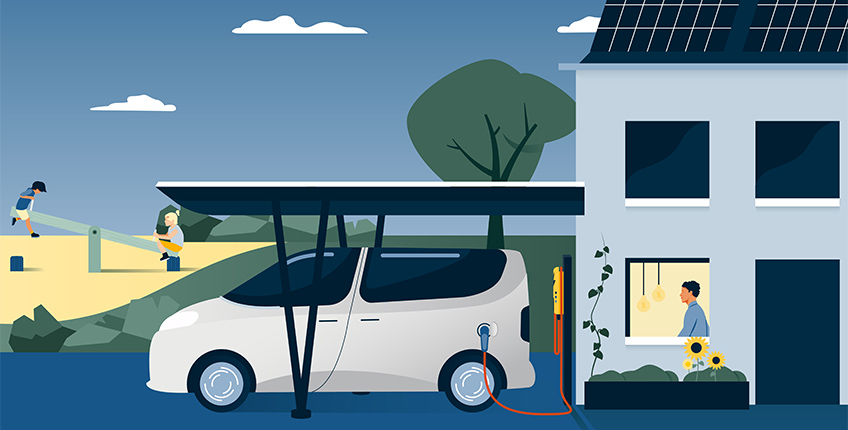Announced by Federal Minister Dr. Volker Wissing, the funding programme for self-generation and use of solar power on residential buildings for electric vehicles begins on 26 September 2023. Owners of owner-occupied residential buildings can apply for a KfW subsidy of up to 10,200 euros for a charging station, photovoltaic system and battery storage, as long as there is an existent electric car or there is a binding order for one.
The subsidy consists of capacity-based lump sums for the photovoltaic system and battery storage as well as fixed amounts for the charging station. An innovation bonus for bidirectional charging is also available. The combination of these systems and controlling them through an energy management system that optimizes your own share of consumption, as provided for under the funding programme, will contribute to climate protection in the transport sector, improve grid stability and reduce dependence on electricity price fluctuations. The Federal Ministry for Digital and Transport (BMDV – Bundesministerium für Digitales und Verkehr) is making up to 500 million euros available for the new funding scheme.
Dr. Volker Wissing, Federal Minister for Digital and Transport said: “With our new funding programme, we are focusing on self-generated electricity for e-cars. The combination of a photovoltaic system, battery storage and charging station in owner-occupied residential buildings is an important step towards sustainable and secure energy provision. We are supporting people who are home-owners and reliant on their cars, like for example, those in rural areas who commute to work or bring their children to sports clubs. By charging at their own homes, we lessen demand for public charging, enable citizens to save on energy costs and at the same time, make a contribution to climate protection.”
The National Centre for Charging Infrastructure, commissioned by the BMDV under the umbrella of federally-owned NOW GmbH, has supported the expansion of charging infrastructure in Germany since 2020 and has worked closely on the development and implementation of the funding programme.
Johannes Pallasch, Spokesperson of the Management Team of the National Centre for Charging Infrastructure: “The option of recharging your own e-car at your home is one of the most frequently used applications of charging infrastructure. Initial findings of a large user survey, currently under evaluation, show that the use of self-generated solar power often shifts charging to a time of day when the electrical grids are less busy. In this way, this funding programme not only supports e-car drivers, but it also alleviates the burden on the electricity grid.”
As with previous successful BMDV programmes, the state development bank KfW will handle the applications, which can be submitted entirely digitally via the KfW’s online customer portal.
Katharina Herrmann, Member of the Board of Management at KfW: “Expansion of electric mobility, combined with the generation and use of ‘green’ electricity is a key factor for the decarbonization of the transport sector. With the new subsidy programme for charging stations, PV facilities and battery storage, we are supporting the further expansion of a decentralized, grid-protecting and climate-friendly charging infrastructure on behalf of the federal government. We are making access as simple as possible through the digital KfW customer portal.”
Funding details:
- The maximum grant amounts to 9,600 euros; the funding of a bidirectional overall system is 10,200 euros.
- The subsidy comprises capacity-dependent lump sums for the photovoltaic systems (min. 5 kWp) and the battery storage unit (min. 5 kWh) as well as a fixed amount per charging point (min. 11 kW).
- The funding of individual components is not permitted. The three components must be newly purchased.
- At the time of application, an own electric vehicle (purely battery-electrically operated (BEV)) must exist or a binding order must exist. Binding proof must be produced at the time of the payment of the subsidy at the latest.
- The self-generated and, as required, temporarily stored photovoltaic electricity must be primarily used for charging an electric vehicle.
- Retroactive funding of measures that have already been initiated is not possible.
- Installation activities are to be implemented by specialist companies and registered with the grid operator after commissioning.
- The use of electricity from 100% renewable energies (primarily from self-generation with the PV system) is a prerequisite for funding.
- Combination with other public funding like loans, allowances and subsidies is not permitted.
Download funding guideline “Solar power for electric vehicles“ (PDF)
Further information and details on the funding programme can be found here: www.kfw.de/442

